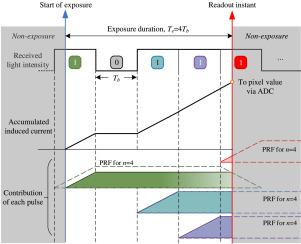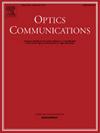Error performance analysis for OOK modulated optical camera communication systems
IF 2.2
3区 物理与天体物理
Q2 OPTICS
引用次数: 0
Abstract
Integrating image sensors’ imaging capabilities into the receiver for visible light communication is a prominent characteristic of optical camera communication (OCC). However, the exposure effect during imaging distorts received waveforms and introduces inter-symbol interference (ISI), leading to decreased OCC reliability. This paper aims to provide an in-depth analysis of the impact of image sensor exposure effects on the error performance of OCC systems. Analytical expressions of the pixel signal-to-interference and noise ratio (PSINR) are derived using the pulse response function (PRF) for an on-off keying (OOK) modulated OCC system with varying exposure times. Furthermore, the bit error rate (BER) performance is evaluated analytically using PSINR, and a straightforward BER measurement scheme is proposed for experimental validation. Results from analyses and experiments conducted under different exposure times indicate that longer exposures lead to increased ISI and decreased PSINR, thereby increasing the error probability of data demodulation. Additionally, a combined impact of noise and exposure on OCC system reliability is observed, highlighting noise-limited and interference-limited characteristics under low and high signal-to-noise ratio (SNR) conditions, respectively. By utilizing PSINR as a bridge, this paper precisely analyzes OCC system reliability under exposure effects, laying a theoretical foundation for system design and optimization.

OOK 调制光学摄像通信系统的误差性能分析
将图像传感器的成像功能集成到可见光通信的接收器中是光学摄像通信(OCC)的一个突出特点。然而,成像过程中的曝光效应会扭曲接收波形并引入符号间干扰(ISI),从而导致 OCC 可靠性下降。本文旨在深入分析图像传感器曝光效应对 OCC 系统误差性能的影响。利用脉冲响应函数 (PRF),得出了曝光时间不同的开关键控 (OOK) 调制 OCC 系统的像素信噪比 (PSINR) 的分析表达式。此外,还利用 PSINR 对误码率(BER)性能进行了分析评估,并提出了一种直接的误码率测量方案用于实验验证。在不同曝光时间下进行的分析和实验结果表明,较长的曝光时间会导致 ISI 增加和 PSINR 降低,从而增加数据解调的错误概率。此外,还观察到噪声和暴露对 OCC 系统可靠性的综合影响,在低信噪比(SNR)和高信噪比(SNR)条件下分别突出了噪声受限和干扰受限特性。本文以 PSINR 为桥梁,精确分析了暴露效应下的 OCC 系统可靠性,为系统设计和优化奠定了理论基础。
本文章由计算机程序翻译,如有差异,请以英文原文为准。
求助全文
约1分钟内获得全文
求助全文
来源期刊

Optics Communications
物理-光学
CiteScore
5.10
自引率
8.30%
发文量
681
审稿时长
38 days
期刊介绍:
Optics Communications invites original and timely contributions containing new results in various fields of optics and photonics. The journal considers theoretical and experimental research in areas ranging from the fundamental properties of light to technological applications. Topics covered include classical and quantum optics, optical physics and light-matter interactions, lasers, imaging, guided-wave optics and optical information processing. Manuscripts should offer clear evidence of novelty and significance. Papers concentrating on mathematical and computational issues, with limited connection to optics, are not suitable for publication in the Journal. Similarly, small technical advances, or papers concerned only with engineering applications or issues of materials science fall outside the journal scope.
 求助内容:
求助内容: 应助结果提醒方式:
应助结果提醒方式:


